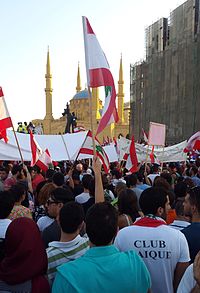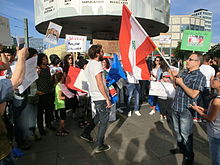You can help expand this article with text translated from the corresponding article in Arabic. (January 2017) Click for important translation instructions.
|
| 2015–2016 Lebanese protests | |||
|---|---|---|---|
 Martyr Square 29 August 2015 Martyr Square 29 August 2015 | |||
| Date | 21 July 2015 – 2016 | ||
| Location | Lebanon | ||
| Caused by | Garbage problem Sectarianism Corruption Unemployment Political dysfunction Power cuts Water shortages | ||
| Goals | Solve garbage crisis Proportional Electoral Law Elect a new parliament Overthrow the government Investigation into actions of police brutality | ||
| Methods | Demonstrations Sit-ins Self-immolation | ||
| Status | Ended | ||
| Parties | |||
| |||
| Lead figures | |||
| Number | |||
| |||
| Casualties and losses | |||
| |||
2015 Lebanese protests also known as the 'You Stink Protests' or the 'You Stink Movement' (Arabic: مظاهرات طلعت ريحتكم ) were a series of protests in response to the government's failure to find solutions to a waste crisis caused by the closure of the Beirut and Mount Lebanon region waste dump in Naameh (south of Beirut) in July 2015. The closure led the region's waste company Sukleen to suspend collection causing piles of rubbish to fill the streets. A series of small but increasing protests, led by grassroots organization "You Stink!," were held throughout the summer, culminating in large protests in August. These attracted thousands of demonstrators but also saw scuffles with police.
The protest were categorized by comical slogans and imaginative chants which mostly linked political figures to the crisis. However, protesters were reported shouting a number of chants made popular during the Arab Spring uprisings across the region, including "Ash-shab yurid isqat an-nizam" (meaning "The people want to topple the regime").
The protests spawned the political campaign Beirut Madinati.
Background
The ‘National Strategy’ for waste management, drawn up in the years after the Lebanese civil war, saw all the waste from the Beirut, Mount Lebanon region going to a single landfill site. The Naameh facility was opening in 1997 as a temporary, short term site that would take just two million tons of rubbish. 18 years later, the site had taken an estimated 15 million tons of waste.
Despite knowing of the closure, the Lebanese government had no plan in place for dealing with the waste. This led waste contractors to suspend collection in July causing waste to pile up around the city. On 27 August, Sukleen restarted collection but with no functioning dump sites, the waste was stored under bridges and on empty lots around the capital.
While the protests began over the piles of trash around Beirut and the Mount Lebanon region, they expanded to issues of civil representation, corruption and government inefficiency.
Protesters blamed Lebanese leaders, who according to them, did not have a long-term vision to solve the ecological issues affecting Lebanon. See Marine environmental issues in Lebanon.
Other issues include daily electricity blackouts, and political bickering that has kept Lebanon without a president from 2014 to 2016.
23 August 2015 demonstration
Lebanese army units were deployed in central Beirut after the demonstration degenerated in street fighting between protesters and law enforcement. The Lebanese Red Cross said it treated 402 people in Sunday's protest. About 40 people were taken to hospital. Ambulances ferried out casualties after security forces fired tear gas, rubber bullets and water cannon at demonstrators protesting against what they call Lebanon's "political dysfunction". About 200 youths, some wearing scarves or masks to cover their faces, threw stones and bottles filled with sand at police and tried to pull down security barricades. Some demonstrators burnt fires. A tree next to a church was set ablaze, road signs were pulled from the ground and shop fronts smashed.
The protest, organized by an online group "You Stink!" along with other civil society groups, attracted an estimated 20000 people on the streets of Riad El Solh Square in central Beirut.
By 29 August, more than 100.000 Lebanese took to the streets to manifest against the government's corruption. It began as small protest, but it has soon proved to become an uprising, with many protesters calling for a revolution.
Reactions
International

- Bahrain: The Ministry of Foreign Affairs renewed its call to Bahraini citizens not to travel to the Lebanese Republic to ensure their security and safety, in view of the unstable security situation in the country, calling at the same time on citizens in Lebanon to leave immediately.
- Kuwait: On 23 August, the Kuwaiti Embassy called on its nationals to remain vigilant for their safety at all times. "Under the current critical circumstances, the Kuwaiti nationals in Lebanon are advised to cancel any unnecessary plans and leave," it said in a statement.
Organisations
- Sigrid Kaag, The U.N. special coordinator for Lebanon, in a statement called for cabinet to resolve the crisis as quickly as possible.
- Euro-Mediterranean Human Rights Monitor: issued a press release documenting the use of excessive force against peaceful protesters by Lebanese authorities in September 2015. The Euro-med called for quick solutions to end the problem by providing a good public-health services which the residents of Lebanon deserve.
See also
- Cedar Revolution
- 2006–2008 Lebanese protests
- 2011 Lebanese protests
- List of protests in the 21st century
References
- "بالصور.... شاب يحرق نفسه امام سراي صيدا الحكومي". saidaonline.com (in Arabic). 23 August 2015. Retrieved 23 August 2015.
- "Protester dies during demonstrations in Beirut". Al Jazeera English. 23 August 2015. Retrieved 23 August 2015.
- Haines-Young, James (24 August 2015). "What does Beirut smell like? From the stench of trash to blood". Al Arabiya English. Al Arabiya English. Retrieved 29 April 2016.
- "Photos: 'You Stink' campaign decries more than garbage buildup in Beirut". PBS NewsHour. Retrieved 29 April 2016.
- Arab, The New. "Top 10 #YouStink protest placards". alaraby. Retrieved 29 April 2016.
- "Lebanese Humor Ever-Present at Civil Society Demo". Naharnet. Retrieved 29 April 2016.
- "Beirut shocks its old guard: The established leaders are jolted by a party of protest". The Economist. 11 May 2016. Retrieved 12 May 2016.
- "Lebanon's rubbish crisis, 40 years in the making". Middle East Eye. Retrieved 29 April 2016.
- "Lebanese protest against waste-disposal crisis". www.aljazeera.com. Retrieved 29 April 2016.
- "Sukleen suspends waste pickup in Beirut… again". The Daily Star Newspaper - Lebanon. Retrieved 29 April 2016.
- "Sukleen resumes trash collection as workers end strike". The Daily Star Newspaper - Lebanon. Retrieved 29 April 2016.
- ""You Stink" activist to LBCI: We will not stand still in face of corruption". www.lbcgroup.tv. Retrieved 29 April 2016.
- "Trash crisis sparks clashes over corruption, dysfunction in Lebanon". Washington Post. Retrieved 29 April 2016.
- "Protests in Lebanon: Talking trash". The Economist. 29 August 2015. Retrieved 30 August 2015.
- Conlon, Kevin; Razek, Raja; Qiblawi, Tamara (24 August 2015). "Army deployed to Beirut after anti-government anger boils over". CNN.
- Chulov, Martin; Shaheen, Kareem (24 August 2015). "Beirut rubbish protesters clash with police amid anger at political paralysis". The Guardian.
- "Beirut rubbish protesters clash with police". BBC News. 22 August 2015.
- "Many injured in Beirut 'You Stink' protest over rubbish". Aljazeera. 23 August 2015.
- Bassam, Laila; Perry, Tom (23 August 2015). "Beirut protests turn violent for second day as PM threatens to quit". Reuters.
- Saad, Hwaida (23 August 2015). "Clashes Break Out During Protests Over Trash Crisis in Lebanon". The New York Times.
- El Deeb, Sarah; Karam, Zeina (29 August 2015). "Thousands of Lebanese protesters stage largest anti-government protest yet over trash crisis". U.S. News & World Report.
- "Rubbish Revolution". Fanack.com. Retrieved 8 August 2016.
- "Ministry of Foreign Affairs renews its call to citizens not to travel to the Lebanese Republic". Ministry of Foreign Affairs. 24 August 2015. Retrieved 24 August 2015.
- "Kuwait, Bahrain issue Lebanon travel warnings". Al Bawaba. 24 August 2015. Retrieved 24 August 2015.
- "U.N. urges restraint in Lebanon protests". alarabiya.net. 24 August 2015. Retrieved 24 August 2015.
- Monitor, Euro-Med. "Lebanese security forces using excessive force against protesters". Retrieved 25 September 2016.